C'est réussi : un examen approfondi de la cloueuse à charpente sans fil DeWalt
Hello, my friend, hello again; today we come together to talk about Nailing It: An In-Depth Review of the DeWalt Cordless Framing Nailer and hope the blog can help you.
Les cloueurs de charpente sans fil offrent mobilité et flexibilité. Découvrez comment le modèle sans fil 20V MAX de DeWalt s’est comporté lors de nos tests pratiques.
A cordless framing nailer offers the advantage of unrestricted movement and gives users the ability to work in tight spaces without the hassle of cords, improving jobsite efficiency. I tested one of DeWalt’s top-rated models—the DeWalt DCN21PLB, which is a 20-volt, 21-degree nailer—to see if it stood up to real-world construction use. DeWalt, a renowned industry leader, consistently delivers high-quality tools, so I was expecting good results.
J'ai mis le DeWalt cordless framing nailer to the test, shooting collated nails into various types of wood (dimensional lumber and hardwood) to assess the tool’s speed, precision, and comfort during prolonged use. My comprehensive evaluation was part of a broader guide focusing on today’s best cordless framing nailers. Perhaps unsurprisingly, the DeWalt cordless framing nailer emerged as the best overall pick.
Competition was tight as I also tested several other excellent framing nailers, including picks from Milwaukee and Paslode. Ahead, find out what the DeWalt framing nailer did right, what it could improve upon, and how it compares to one of its closest competitors—the Milwaukee M18 FUEL 21-degree cordless framing nailer.
DeWalt 20V MAX Cordless Framing Nailer: At a Glance
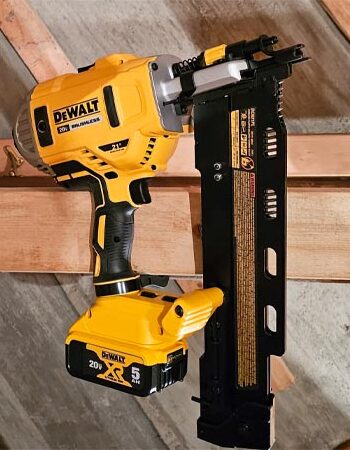
Notation: 9/10
CARACTÉRISTIQUES
- Nailer type: 21-degree cordless framing nailer
- Primary purpose: Residential framing
- Fastener type: Collated nails up to 3.25 inches long
- Source d'alimentation : Batterie lithium-ion rechargeable
- Stall release? Oui
- Bump mode? Oui
- Model number: DCN21PLB
AVANTAGES
- Dry-fire lockout prevents the nailer from firing when the nail case is empty
- Holds up to 49 plastic collated nails to reduce frequent reloading
- Adjustable rafter hook fits over rafters and joists to keep tool handy at heights
- Stall release simply and quickly clears a stalled fastener
- 21-degree angle makes it easier to insert nails at an angle (toenailing)
- Cordless power allows for use in remote locations
CONS
- No quick-jam release—but I didn’t experience any nail jams in testing
- Slight slowing of recovery time after 5 to 7 rapid-fire shots in bump mode
Get the DeWalt 20V MAX cordless framing nailer at:
- Ace Hardware for $369.00
- The Home Depot for $369.00
- The Home Depot (with 5Ah battery and charger) for $518.00
- Acme Tools for $369.00
- Toolbarn for $369.00
- Zoro for $403.12
What is the DeWalt cordless framing nailer?
All framing nailers are made to drive large nails into studs, joists, rafters, and sheathing to hold them together. They’re not fine-tuned cloueuses de finition—framing nailers must be powerful while permitting the user to reach into angled spots to connect perpendicular boards. The DeWalt 20V MAX cordless framing nailer (model DCN21PLB) excels in driving 21-degree collated nails up to 3.25 inches long and 0.148 inches in diameter, making it versatile for various construction applications.
I liked the user-friendly design of this framing nailer, which features a compact and well-balanced shape that’s comfortable to grip even for extended periods of use. The cordless battery power is a significant advantage, as it eliminates the need to set up a compressor, run extension cords, or purchase costly fuel-cell replacements, saving both time and money on the jobsite.
In addition to its core features, this DeWalt framing nailer offers several notable enhancements, including a stall-release lever that allows the user to release a fastener that becomes stuck in the tool et in the wood at the same time. Unfortunately, it doesn’t offer a quick-jam release, but most framing nailers don’t—those are typically found on smaller brad-type nailers.
The rafter hook was one of my favorite features. There’s nothing worse than framing rafters or ceiling plates and setting an expensive pistolet à clous on a board, only for it to fall to its demise below. I also like the tool’s dry-fire lockout—I’ve been known to fire several fasteners only to discover I was firing blanks because I was out of nails. This feature is both a time- and frustration-saver. Since the nailer doesn’t fire when the nails run out, I knew right away when to put in another strip.
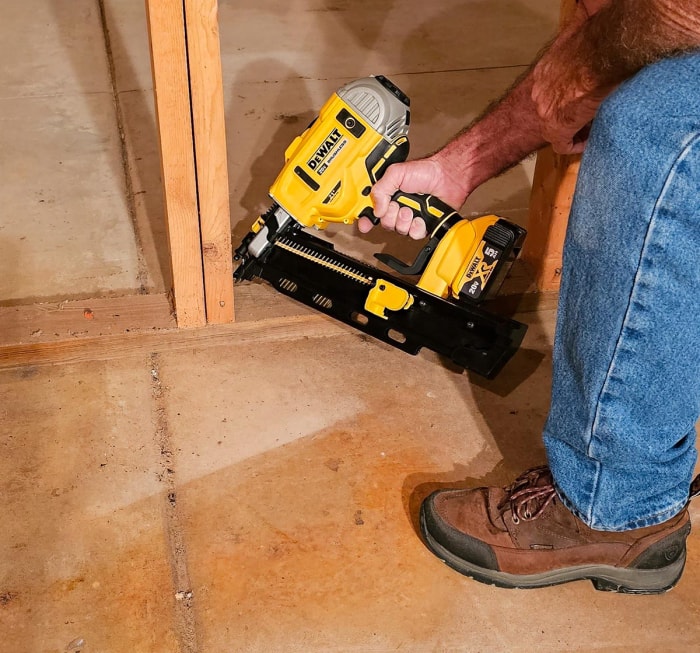
How well does the DeWalt cordless nailer perform framing tasks?
This DeWalt framing nailer is a versatile workhorse. It excelled in several framing tasks, including subfloor installation, framing walls and rafters, and toenailing. One notable aspect is its power. The nailer effortlessly sank 3.25-inch nails, rivaling the performance of my pneumatic framing nailers.
While the majority of my tests yielded positive results, it’s worth noting the DeWalt framing nailer is most effective for sequential nailing (single-shot) or short bursts of bump-fire nailing. I switched to rapid-fire mode, and the nailer slowed down after five to seven consecutive bump- fire shots—but just slightly. This indicated to me that it has a slower recovery time than a pneumatic nailer. Still, if I gave the nailer just a few seconds to recover, it was ready to go again. Bump-fire mode is ideal for tasks such as attaching subflooring, but users probably won’t need it very often unless they’re professionals.
The depth adjustment feature was useful, particularly when I was working with different wood densities and shooting fasteners at various angles. This flexibility ensured that I could fine-tune the nailer’s performance to suit the specific demands of each test.
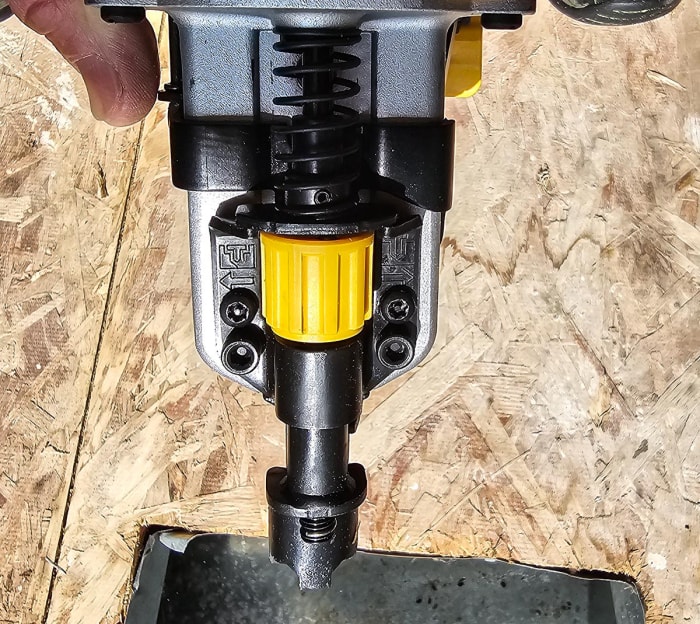
Is the DeWalt cordless framing nailer comfortable and easy to use?
Le DeWalt 20V MAX cordless framing nailer offers a user-friendly experience, which is essential for extended construction work periods. Its ergonomic grip provides a secure and comfortable hold when users are shooting fasteners at various angles and heights. The ability to hang the tool on rafters or joists further enhances convenience, as doing so keeps it within easy reach and reduces its risk of falling. At 8.5 pounds, it wasn’t the heaviest nailer I tested, but it wasn’t the lightest either. The comfort level a user experiences while working overhead will depend on the individual’s physical strength.
This framing nailer’s straightforward operation and well-balanced design can accommodate users of different skill levels. Whether a seasoned pro or a weekend warrior tackling home improvement projects, users will find the DeWalt nailer to be a convenient and enjoyable tool.
The depth-adjustment feature on the nailer also adds to its ease of use. It offers precise control over fastener placement when users are working with different wood types and angles. I frequently used the depth adjustment when switching between straight-on nailing and toenailing.
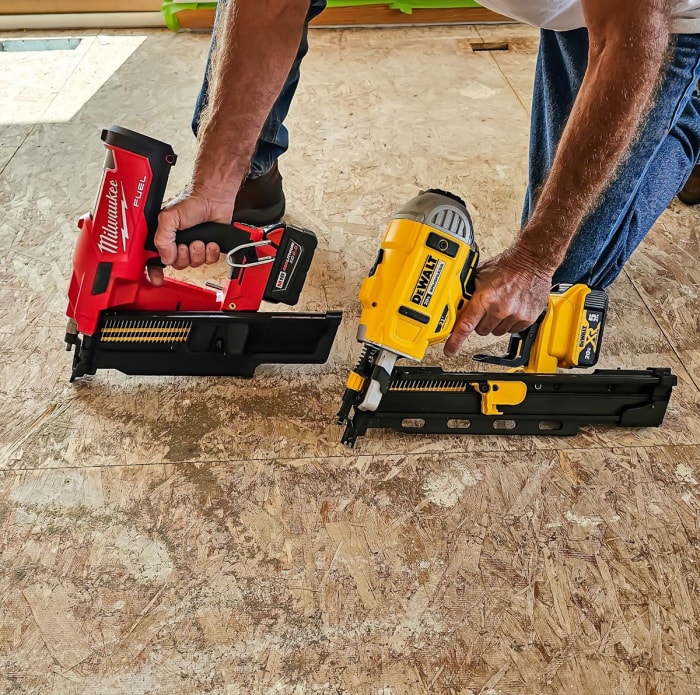
How do the DeWalt framing nailer and the Milwaukee framing nailer compare?
Choosing just one overall winner was difficult during my testing of several high-quality power tools. In our comprehensive lineup of the best cordless framing nailers, the Milwaukee M18 FUEL (model 2744-21) came in a close second. Still, I found many similarities in both performance and design between these top two framing nailer brands. Those interested in getting the best cordless framing nailer will almost certainly want to know how these tools compare.
- Performance: Both nailers excel in performance and are capable of driving full round head nails into dense engineered lumber. The Milwaukee M18 FUEL boasts enhanced performance thanks to a nitrogen spring mechanism. It scored higher than the DeWalt nailer in rapid-fire mode—I could fire more than 10 nails in rapid bump succession without it lagging. In contrast, the DeWalt nailer, while powerful, displayed slightly slower recovery in bump-fire mode after five to seven consecutive shots.
- Jam handling: The DeWalt nailer demonstrated a lower jamming frequency, but the Milwaukee M18 only jammed twice, both times when it was used in hardwood. Unfortunately, neither nailer has a quick-jam release, so both tools require the user to remove the plate on the head before extracting the jammed nail with pliers.
- Puissance de la batterie : Both framing nailers operate on battery power, making them equally beneficial for use in remote locations and when an electrical outlet is unavailable. This feature also eliminates both the cost of gas cartridges et the tripping risk of electrical cords. However, remembering to keep the batteries charged will be essential to users having the nailers ready at a moment’s notice.
- Convenience: The DeWalt framing nailer typically (but not always) sells as “tool only,” meaning the battery and charger must be purchased separately. The Milwaukee M18 FUEL comes as a kit with valuable extras including a rechargeable battery, a charger, and a contractor bag, enhancing its overall convenience.
- Weight and ergonomics: The Milwaukee M18 FUEL nailer weighs approximately 11 pounds—2.5 pounds heavier than the DeWalt nailer, which weighs in at 8.5 pounds. Ergonomics and ease of use will depend on individual preferences and the specific demands of the job, but I found both tools to be well designed and comfortable to grip.
The DeWalt 21-degree cordless framing nailer and the Milwaukee M18 FUEL 21-degree framing nailer are both formidable framing nailers. Choosing between them may hinge on factors such as user preferences regarding weight and ergonomics—I prefer a more lightweight model, so the DeWalt is my choice. Both nailers offer professional-grade performance and set high standards in the cordless framing nailer category.
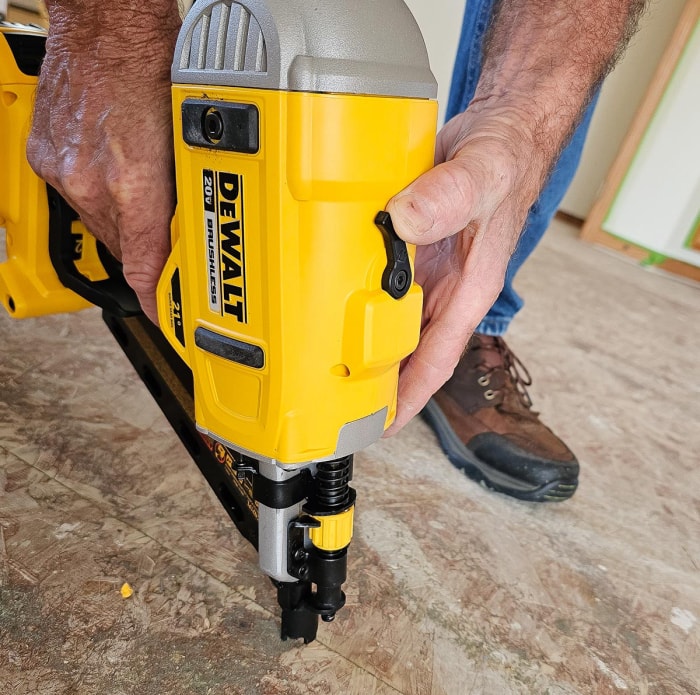
Should you buy the DeWalt cordless framing nailer?
Whether you should buy the DeWalt cordless framing nailer depends on your specific needs, preferences, and the nature of your construction projects. Here are some considerations from my observations to help you make an informed decision:
- Cordless convenience: The DeWalt nailer offers the freedom of cordless operation, eliminating the need for a compressor or cords. This portability enhances maneuverability on the jobsite and allows you to work remotely.
- Versatile performance: This nailer excels in driving full-collated strip nails up to 3.25 inches. I found it more than suitable for various framing tasks, including sheeting, subfloor installation, and wall/rafter framing.
- Stall release: While the framer doesn’t offer a quick-jam release, it comes with a stall release that allows the user to pull a lever on the top of the tool if a nail stalls or becomes stuck in both the wood and the tool. Stalls typically happen when the battery runs low and the tool struggles to sink the nail.
- Réglage de la profondeur : The depth-adjustment feature enables precise control over fastener placement, accommodating different wood types and angles. I loved this feature and used it frequently.
- Ergonomic design: The nailer features an ergonomic grip for comfort over extended use.
- Poids: The DeWalt nailer weighs 8.5 pounds without the battery, which may be a consideration for extended overhead work. Although not as heavy as the Milwaukee 18 FUEL framing nailer, it’s heavier than most pneumatic or gas-powered framers.
- Bump-fire limitations: In bump-fire mode, the nailer displayed slightly slower recovery after five to seven consecutive shots, indicating a subtle difference in power delivery compared with pneumatic nailers. While suitable for DIYers and pros, professionals who need to install sheathing quickly may find the recovery too slow for their needs.
Overall, the DeWalt framing nailer has earned its place as a dependable option in the cordless framing nailer category.
Where to Buy the DeWalt Cordless Framing Nailer
Get the DeWalt 20V MAX cordless framing nailer at:
- Ace Hardware for $369.00
- The Home Depot for $369.00
- The Home Depot (with 5Ah battery and charger) for $518.00
- Acme Tools for $369.00
- Toolbarn for $369.00
- Zoro for $403.12
Rencontrez le testeur
Glenda Taylor est une testeuse de produits et une rédactrice spécialisée dans les secteurs de la construction, de la rénovation et de l'immobilier. Elle et son mari sont propriétaires d'une entreprise de construction générale et Taylor possède une expérience dans les applications de construction résidentielle et commerciale. Elle teste une large gamme d'outils électriques ainsi que d'autres produits de rénovation, de ménage et de jardinage.






